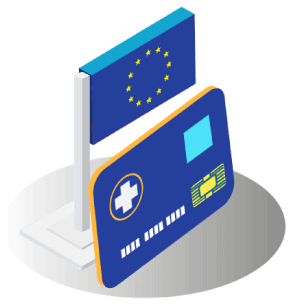The European Health Insurance Card (EHIC): What it is and how it will change after Brexit

Want to subscribe to a French energy offer?
Our English-speaking Selectra advisors are here to help you find the right energy plan.
(foreign IBANs accepted) at [email protected]. You can contact us also:

If you’re a resident of the European Union, you should already be familiar with your European Health Insurance Card, or EHIC for short. It allows you access to state healthcare when you are travelling within the European Union, Switzerland, or the European Economic Area (EEA). The coverage you will receive is provided at a reduced cost, and sometimes even free.
But while the EHIC is handy, the regulations behind it will likely change when Brexit is in full-force. Here’s how you can apply for your own EHIC and what you need to know about it once the Brexit deadline hits.
Having EHIC does not mean you have travel insurance. You should always consider buying travel insurance when travelling abroad for other non health-related emergencies.
Am I eligible for EHIC?

Yes, if you are insured or covered by a social security system of a member state of the European Union, EEA or Switzerland. You must also be a resident of one of these places.
If you are a non-resident of the EU but are legally living there and are still covered by a social security system, you may also apply for an EHIC as long as you show proof of residency.
Non-EU nationals cannot use their EHIC in Denmark, Iceland, Liechtenstein, Norway and Switzerland.
If you are over the age of 16 you can make your own application. If you are under 16, your parent or guardian must make an application for you.
You can find out where you can apply in your country here.
Every individual family member must have their own European health card when travelling.
How do I apply for an EHIC card?
Contact your country’s health insurance institution to start your EHIC application. It is free to apply.
The validity of the card depends on what country your card was issued, but it is typically valid for five years. You can renew your card up to six months before it expires. The renewal application process is free. Be wary of scams from unofficial websites charging for EHIC renewals.
UK residents can apply with this form here or online here.
Using your EHIC abroad
Bring your EHIC with you while you are travelling. To use it, you will typically pay your medical costs upfront and will then be reimbursed at a later date.
In countries where the social security system pays only 70% of health costs (such as France), you will have to pay the remaining 30% out of pocket. This is usually not reimbursable.
Always ask for a receipt after you use your EHIC in order to claim your reimbursements.
Show your card to the nurses or doctors that are taking care of you. In some countries you may be able to use your EHIC to see a private doctor, but check with your healthcare institution before you travel to make sure.
If you are travelling and your EHIC is not recognized by authorities in an EU or EEA country or Switzerland, you can ask your local health insurer or state health institution to contact the doctor or hospital that you are seeking treatment from abroad.
Your EHIC covers unplanned health emergencies while travelling, such as a broken bone or catching a virus, or treatment for ongoing health conditions such as diabetes. If your purpose for travel is only to receive medical treatment in another country, EHIC will not cover you.
What happens to my EHIC after Brexit?

This all depends on if the UK is able to strike a deal with the EU before the October 31, 2019 deadline.
If we use France as an example, under normal circumstances, you would be able to use your EHIC card in France only if you were travelling within the country for no more than 90 days.
The UK has proposed allowing EHIC to continue covering UK residents in France after Brexit. However, the French government has suggested differently, saying that EHIC will not be valid if there is no deal.
It is not confirmed whether this will be the case for other European Union member states. Due to this uncertainty, it’s best to buy extra insurance when you travel to ensure you have some sort of coverage if there is a no-deal situation.
If you’ve decided to forego the UK altogether (before or after the deadline) and, for example, have chosen to move to France, you will have to apply to be a part of the French social security system in order to reap the benefits of health insurance in France.
You can find out more about the French healthcare system here.
If you are a UK national already living in another EU country, you should have already applied for health insurance in that country to ensure you are covered. If you haven’t, make it a priority to apply now.